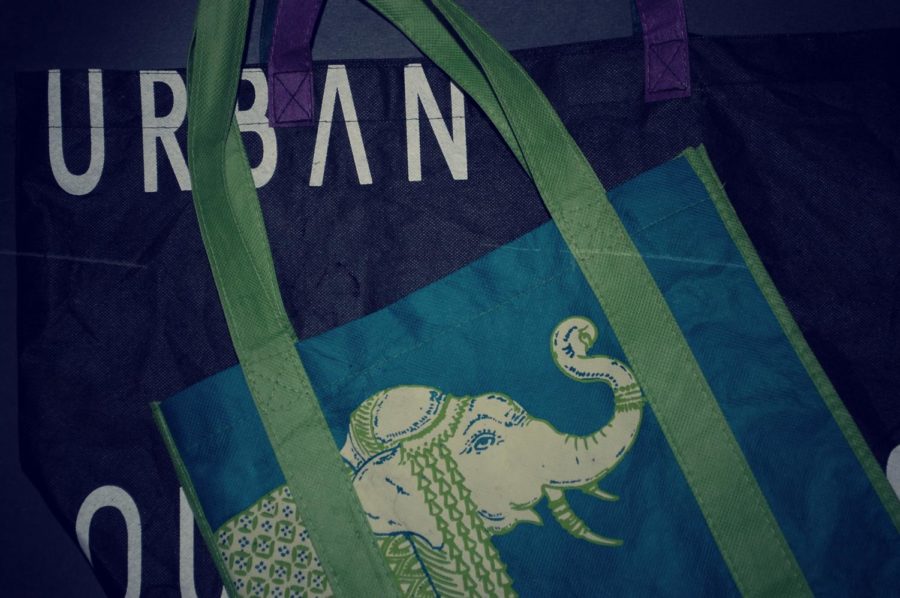Daily: Answer ‘Paper or plastic?’ with cloth
September 19, 2012
“Is plastic okay?” We hear this question at any grocery store — it’s more of a commonplace courtesy than it is a real concern. Why? Is there another option?
As consumers, we often hear phrases like “going green” and “reduce, reuse, recycle,” but do we really take them to heart? Naturally, it is easier to embrace these ideas in speech versus action. But you don’t have to be a hipster or a tree hugger to help. There are simple ways to save money and the environment.
What was once thought to be a harmless, efficient solution for carrying groceries is now clearly an environmental hazard. The appearance of nonplastic bags at chain stores signals there must be more than meets the eye when it comes to plastic bags.
The common belief is that plastic bags are cheap to produce, plentiful, easy to carry and easy to store. The latter two facts may be true — though cloth bags are equally efficient and easy to store — but plastic bags are no money saver.
Vincent Cobb, an entrepreneur in Chicago who launched the website ReuseIt.com to educate the public about costs of these “free” plastic bags, said the United States goes through 100 billion bags annually at an estimated cost of $4 billion to retailers.
Not only are there huge financial costs but also, and perhaps more importantly, dangerous environmental costs. Plastic stays plastic. It is nonbiodegradable. A single bag can take up to 1,000 years to degrade. Plus, the bags remain toxic even after they break down. Cobb, mentioned above, said this toxicity is called “photodegradation,” which means the materials fragment and soak up toxin. These toxins then readily contaminate soil, waterways and animals upon digestion.
Not only are animals poisoned by these toxins, but they are also often choked to death by becoming ensnared in discarded bags. This death is especially prevalent in marine life that is entrapped in plastic. This amount of plastic in the ocean has accumulated at an alarming rate — there is literally an island of floating plastic trash just 500 nautical miles off the coast of California. The “island” is is 7 billion pounds of plastic garbage that measures twice the size of Texas. Scary, right?
Another environmental concern is pollution from the manufacturing. Kay Bushnell, writer for the Sierra Club, published the article “Plastic Bags: Switching to Reusable Cloth Bags,” which described the process: “Plastic bags begin as crude oil, natural gas, or petrochemical derivatives that are transformed into resins. The resin is heated and extruded, flattened, sealed, punched and printed on. The environmental cost of plastic bags is huge. The plastic bags that have inundated our planet are derived from a non-renewable resource; they never break down completely; they strangle wildlife; and they clog single stream recycling machinery.” Why should we contribute to the oil crisis when the use of plastic bags could be eliminated?
The article published by the Sierra Club noted several steps that have been taken to reduce and reuse plastic bags. Several countries, particularly in Europe and Asia, have placed taxes on bags to reduce the number of bags used. This solution has been successful, for example, in Ireland the number of plastic bags decreased by 90 percent in the first five months of a 15 euro cent tax being placed on each bag. Working to reduce the number of bags introduced into the environment is a positive step forward.
A transitional step to reuse already existing plastic bags also has potential to be successful. Plastic bags can be reused up to 50 times and can be washed out between uses, if necessary.
But an easily solution is at hand — cloth bags. Say no to paper and plastic. Reusable cloth bags cost only $5 to $10 and can be used thousands of times. While it can be hard to remember to bring the bag shopping at first, it is habit that can be formed. As Cobb said, this cultural shift away from a “use-and-toss” culture can eliminate hundreds, if not thousands, of bags.
Why wait to enact this change? If it takes taxes on plastic bags or more marketing of alternative reusable bags, so be it. Why add to the “island” of plastic in the Pacific when you can leave a lighter environmental footprint and reduce pollution?
When asked “Paper or plastic?” the answer is neither, but instead, cloth.







